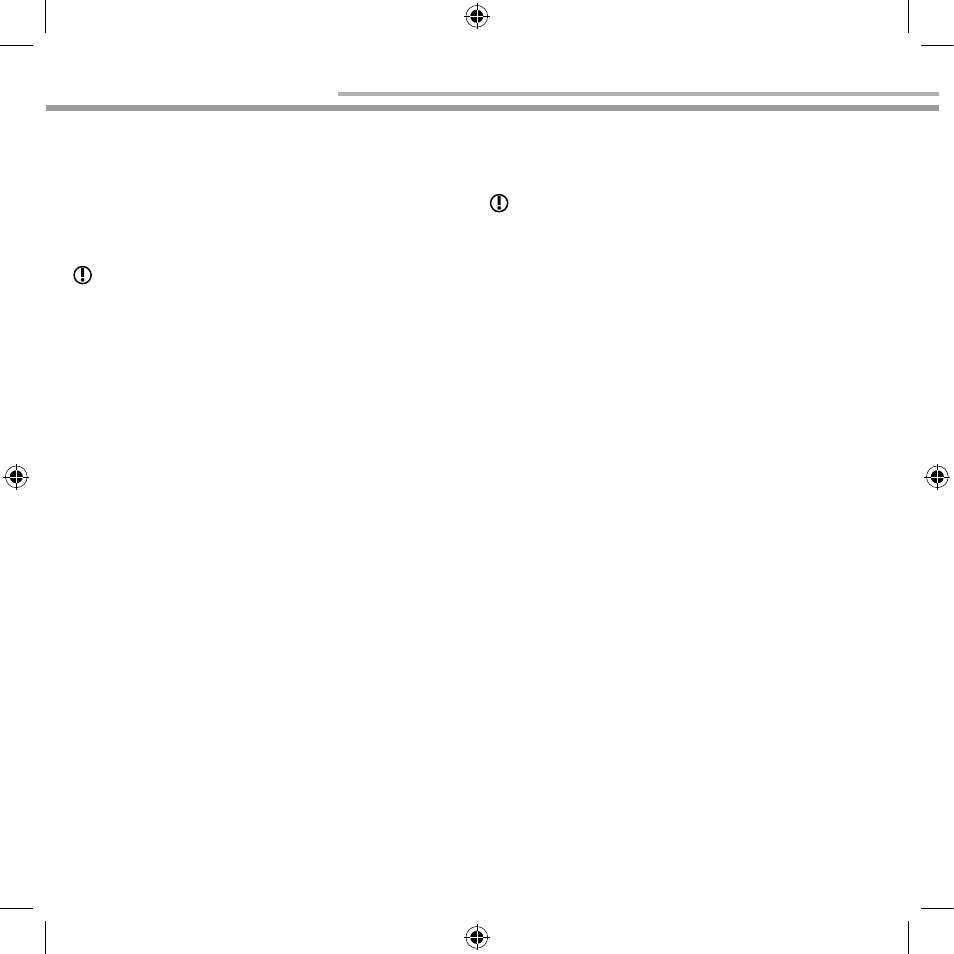Assembly and installation, Installing the camera, Connecting the camera to the television – Dexaplan MC 610 User Manual
Page 6: Operation, Optional accessories, Rectifying faults

8
GB/IE
(refer to Fig. C), so that the cable feed hole is pro-
tected by the cable cover
}
(see Figs. C and H).
Ensure that the hole is large enough for the cable
plug
R
of the connection cable (min. 8 mm).
o
Push the cable plug
R
from inside to outside
through the hole.
Tip! Do not try to cut through the connection
cable or take off the cable plug.
o
Pull through enough of the connection cable
T
so that it reaches the camera
Q
.
Installing the camera
See Fig. C
o
Mount the bracket
{
at the proposed installation
site using the supplied mounting screws
y
and
dowels
u
(hole spacing 30 mm, drilled depth
approx. 2 mm).
See Fig. D
o
The bracket, washer and attachment clamp
r
have been preassembled together at the factory
with the nut
q
and clamp bolt
t
.
See Fig. E
o
If necessary loosen the clamp bolt
t
fastened
with the nut
q
using the supplied Allen key
i
,
so that the attachment clamp
r
can be moved.
o
Push the ball joint
E
of the camera between the
bracket
{
and attachment clamp
r
.
See Fig. F
o
Now use the supplied Allen key
i
to carefully
tighten the clamp bolt.
Tip! Tighten the clamp bolt enough so that the
camera is held in the desired position. Do not
over-tighten the bolt or the bracket may be damaged.
o
Now insert the cable plug
R
through the cable
eye
e
into the hole in the ball joint
E
of the
camera and press it in firmly.
Insert the cable plug so firmly into the ball joint
that you hear three clicks. Only when you do this
is the cable properly connected.
See Fig. G
o
If the camera is mounted outside a building and a
cable feed hole
p
has been made then the hole
must be sealed, e.g. with silicone.
See Fig. H
o
Push the cable cover
}
over the guide from front
to back. If the connection cable
T
is led over a
surface (not fed through a drilled hole directly be-
hind the cable cover) then you must cut out one
of the three preformed breakout areas
[
(see
Fig. I) in the cable cover.
See Fig. B
o
Lay the connection cable
T
back to your televisi-
on and if necessary fix it in place using the sup-
plied cable clips
o
.
Assembly and installation
Connecting the camera to the television
See Fig. B
Connect the Scart-plug
U
to the scart socket of your
television set. If you do not have a scart socket on
your television or the scart socket is already occupied,
then you can connect the camera through a video
recorder
A
with a scart input
S
(see Fig. K). Alterna-
tively you can use a scart switcher (available in
electrical appliance shops).
o
Connect the mains cable plug
O
to the socket
Y
.
o
Connect the mains adapter
I
to a 230 V mains
socket
D
.
Operation
o
Switch on your television set.
o
Select the AV channel (on most televisions it may
be called VCR, channel 0 or marked with the
symbol
). If the camera is connected
through a video recorder (see Fig. K), select the
AV channel as above.
You should now see the camera image and hear
the sound from the microphone integrated into
the camera.
Optional accessories
Extension cable
The camera cable can be extended to a maximum
length of up to 4 m. 10 m extension cables are
available for this (MC-10 M). The extension cables are
fitted with a cable plug and a cable socket and can
therefore be connected together.
You can find information about ordering an extension
cable or other accessories on the Internet at
www.dexaplan.com
Rectifying faults
Fault
Cause
Remedy
No picture /
sound
Television is
not tuned to
the AV channel
Switch your te-
levision to the
AV channel cor-
responding to the
scart connector
Camera has
no power
supply
Check the
mains adapter
connection.
The connection
to the camera
is interrupted
Check that the
scart plug is
properly seated
and that the ca-
ble plug is fully
inserted (when
you insert it you
must hear 3 x
clicks)
KOE27_T02_Content.indd 8
23.10.2006 9:56:01 Uhr
